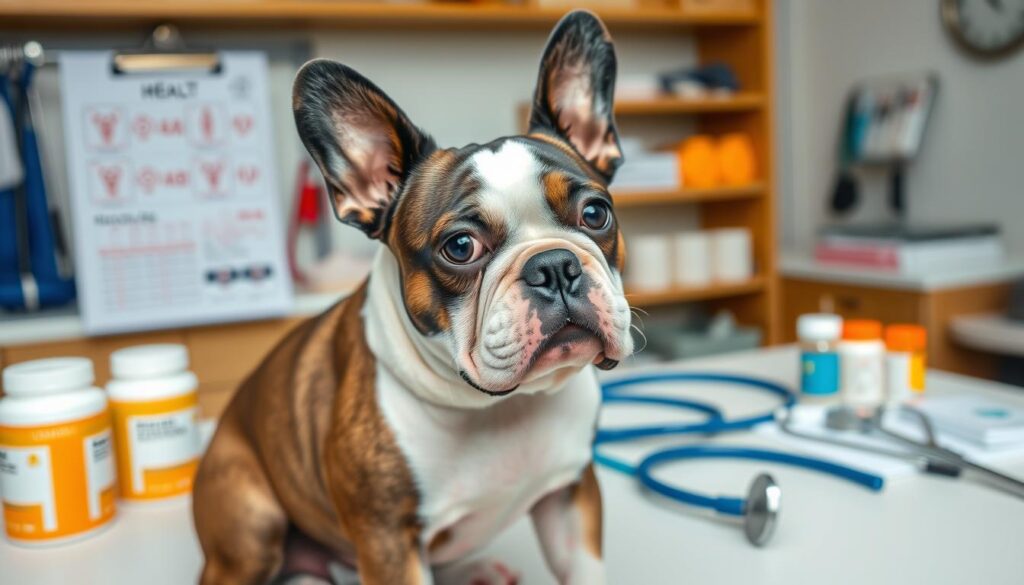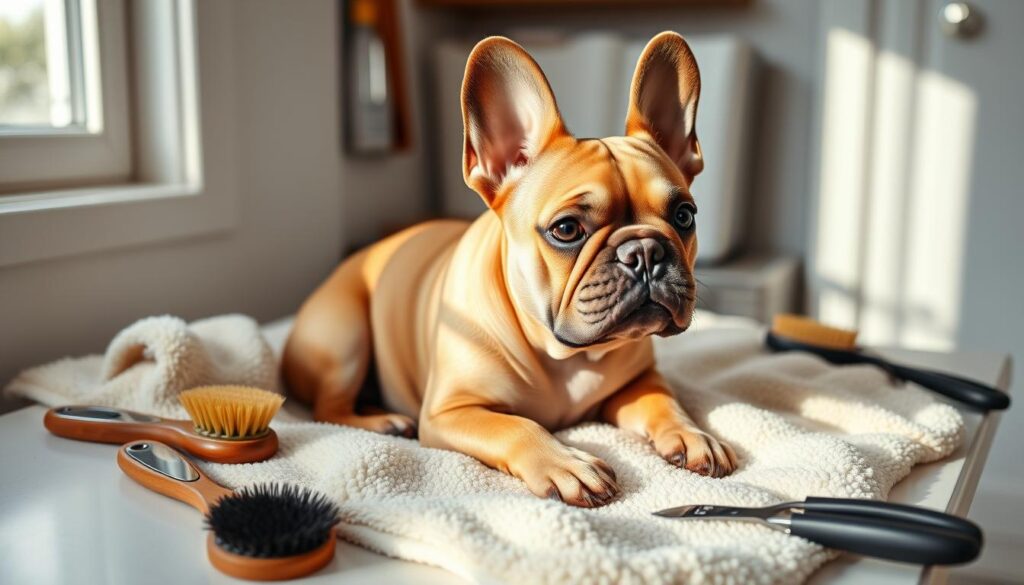Did you know French Bulldogs were the top dog breed in the U.S. in 2022? The American Kennel Club reported this. As a French Bulldog fan, I’m eager to share what I know about these lovable dogs.
French Bulldogs have a unique look. They have a short muzzle, wide face, and big ears. These small dogs weigh 16 to 28 pounds and are 11-13 inches tall.
Frenchies are loved pets, but they face health issues. Up to 60% may have Brachycephalic Obstructive Airway Syndrome (BOAS). This costs a lot for vet care, from $1,000 to $2,500 a year.
Despite health problems, French Bulldogs are great pets. They love people and do well in small spaces. With the right care, they can live 10 to 14 years happily.
Key Takeaways
- French Bulldogs were the most popular dog breed in the U.S. in 2022
- They typically weigh 16-28 pounds and stand 11-13 inches tall
- Up to 60% of Frenchies may show signs of BOAS
- Annual vet costs can range from $1,000 to $2,500
- With proper care, French Bulldogs can live 10-14 years
- They adapt well to apartment living and crave human companionship
French Bulldog Breed Overview:
| Breed Attributes | Details |
| Origin | France |
| History | Developed in 19th century as companion dog |
| Affectionate with Family | Very high |
| Good with Children | Yes, when supervised |
| Good with Other Dogs | Moderate, socialization needed |
| Ideal Family | Active families, singles, seniors |
| Space Needs | Adaptable to small spaces |
| Shedding Level | Moderate |
| Coat Grooming Frequency | Weekly |
| Coat Type | Short, smooth |
| Coat Length | Short |
| Drooling Level | Low |
| Openness to Strangers | Friendly |
| Playfulness | High |
| Type of Dog | Companion, not guard dog |
| Trainability | Moderate, can be stubborn |
| Energy Level | Moderate |
| Barking Level | Low to moderate |
| Mental Stimulation Needs | Moderate |
| Dietary Requirements | Prone to obesity, controlled diet needed |
Understanding the French Bulldog Breed History
I’m excited to share the fascinating journey of the Bouledogue Français, commonly known as the French Bulldog. This breed’s story is a tale of transformation and rising popularity that spans centuries and crosses borders.
Origins in England and France
The French Bulldog’s roots trace back to the Industrial Revolution. English lacemakers, facing job losses, moved to Northern France, bringing their small English Bulldogs with them. These dogs, likely bred with pugs and terriers, evolved into the Bouledogue Français we know today.
Evolution of the Breed Standards
As the breed developed, so did its standards. The English Toy Bulldog, a precursor to the Frenchie, first appeared in dog shows in the 1830s. Later, American fanciers established the first French Bulldog club in the U.S., standardizing the breed’s iconic “bat” ears.
| Characteristic | Male | Female |
|---|---|---|
| Height | 27-35 cm | 24-32 cm |
| Weight | 9-14 kg | 8-13 kg |
Rise to Modern Popularity
The French Bulldog’s charm as a “clown dog” has led to its soaring popularity. In 2023, it became the most popular breed in the U.S., dethroning the Labrador Retriever after 31 years. This rise is remarkable, considering it ranked 54th in 2003.
The Bouledogue Français has come a long way from its humble beginnings. Today, it’s beloved worldwide for its compact size, endearing personality, and adorable bat ears.
Physical Characteristics and Breed Standards
French Bulldogs are charming little dogs with unique features. Their compact, muscular bodies and adorable bat ears make them stand out. As a brachycephalic breed, they have a special facial structure that’s both cute and needs extra care.
Size and Weight Requirements
Frenchies are small to medium-sized dogs. Males weigh about 28 pounds, while females weigh around 24 pounds. They are between 11 and 13 inches tall, making them great lap dogs.
Distinctive Facial Features
The French Bulldog’s face is their most striking feature. They have a square-shaped head with a well-defined muzzle and a clear stop. Their eyes are round and moderately sized, set wide apart. But it’s those bat ears that really catch your eye – they’re medium-sized, wide at the base, and set high on the head.
Coat Colors and Patterns
Frenchies come in a variety of colors and patterns. For show purposes, the accepted colors are brindle, fawn, and pied. Their coat is short, smooth, and fine-textured, giving them a sleek appearance. While rare colors like blue, merle, and lilac exist, they’re not recognized in breed standards.
| Feature | Description |
|---|---|
| Body Shape | Cobby, muscular, well-rounded |
| Neck | Powerful, moderate length |
| Hindquarters | Strong legs, moderate angulation |
| Coat | Fine, smooth, lustrous, short |
French Bulldog Temperament and Personality
French Bulldogs are known for their charming personalities and affectionate nature. They are often called “velcro dogs” because they love to stick close to their owners. They are always ready for cuddles and attention.
These dogs are great companions for families with children over five years old. Their friendly demeanor makes them perfect for families.
One of the most endearing traits of Frenchies is their playful spirit. They are often called the clowns of the dog world. Their antics can keep you entertained for hours.
Don’t be surprised if you hear some snorts and snores along the way. These snorter dogs have a unique way of expressing themselves!
While Frenchies are generally accepting of unfamiliar dogs and people, they’re not overly exuberant about it. They make moderately good watchdogs but aren’t suited for protection duties. Training can be a bit challenging due to their stubborn streak, so patience is key.
| Trait | Description |
|---|---|
| Temperament | Clownish, playful, affectionate |
| Sociability | Generally accepting of strangers |
| Watchdog ability | Moderate |
| Training difficulty | Requires patience due to stubbornness |
It’s worth noting that only 9% of behavior variation in dogs is attributed to breed. This means that while Frenchies have certain tendencies, 91% of their personality is shaped by factors like upbringing and training. With proper socialization and care, your French Bulldog can become a loving and well-behaved companion.
Common Health Issues and Concerns

French Bulldogs face many health challenges that owners must watch out for. Their unique looks can lead to several problems. Let’s look at the most common issues and how to care for your Frenchie.
Brachycephalic Airway Syndrome
French Bulldogs often have trouble breathing because of their flat faces. This can be serious and even life-threatening. Almost all Frenchies have some breathing issues, so it’s important to keep an eye on their breathing.
Spinal and Joint Problems
French Bulldogs are prone to spinal and joint problems because of their body shape. About 70% of them have Intervertebral Disc Disease (IVDD). They’re also more likely to break their elbows. Regular vet visits and keeping them at a healthy weight can help.
Skin and Allergy Conditions
French Bulldogs often get skin allergies between 1-3 years old. These can cause a lot of itching and discomfort. They also have wrinkly skin that can get infected. Keeping their skin clean and well-groomed can prevent these issues.
Eye and Ear Issues
French Bulldogs can have eye problems like cataracts and corneal dystrophy. Their big eyes are also more likely to get hurt. Ear infections are common too, affecting 20-30% of them. Regular ear cleaning and vet visits are key to managing these issues.
| Health Concern | Prevalence | Prevention/Management |
|---|---|---|
| BOAS | Nearly 100% | Avoid overexertion, maintain healthy weight |
| IVDD | 70% | Regular exercise, avoid jumping |
| Skin Allergies | 80% of allergic dogs | Proper diet, regular grooming |
| Ear Infections | 20-30% | Regular cleaning, prompt vet care |
Exercise and Activity Requirements
French Bulldogs are great for apartment living because they don’t need a lot of exercise. They need about 30 minutes to an hour of light activity each day. This makes them perfect for city living or small spaces.
Frenchies have special needs because of their flat faces. They can have trouble breathing, so it’s important not to overdo it. Short walks and indoor play are best to keep them healthy and safe.
Here’s a breakdown of suitable activities for French Bulldogs:
- Short, leisurely walks
- Indoor games with toys
- Light obedience training
- Puzzle toys for mental stimulation
It’s also important to avoid exercise when it’s too hot or humid. Instead, play indoors or go for walks when it’s cooler.
| Age | Daily Exercise Time | Activity Type |
|---|---|---|
| Puppy (4 months) | 20 minutes | Short walks, gentle play |
| Adult | 30-60 minutes | Walks, indoor games, light training |
| Senior | 20-30 minutes | Gentle walks, mental stimulation |
By following these guidelines, you’ll keep your French Bulldog happy, healthy, and fit without overdoing it. Remember, every dog is unique, so pay attention to your pup’s cues and adjust their activity level as needed.
Grooming and Maintenance Needs

French Bulldogs are adorable companions with unique grooming needs. I’ll guide you through the essentials to keep your Frenchie looking their best while maintaining their health.
Coat Care and Brushing
French Bulldog appearance is characterized by a short, smooth coat that’s relatively low-maintenance. I recommend weekly brushing with a rubber brush to reduce shedding and keep their coat shiny. During spring and fall, when Frenchies experience major molts, you might need to brush more frequently.
Skin Fold Maintenance
The adorable wrinkles that define French Bulldog appearance require special attention. Clean facial folds at least once a week to prevent infections. For light-colored Frenchies prone to tear stains, I suggest using a tear cleanser daily. It can eliminate brown stains completely with regular use.
Nail and Dental Care
Nail trimming is key for your Frenchie’s comfort. I trim my dog’s nails monthly, being extra careful with dark nails where the quick is hard to see. For dental health, daily brushing is ideal to prevent tartar buildup, a common reason for vet visits.
| Grooming Task | Frequency |
|---|---|
| Brushing | Weekly (more during shedding seasons) |
| Bathing | Monthly |
| Fold Cleaning | Weekly (minimum) |
| Nail Trimming | Monthly |
| Teeth Brushing | Daily |
By following these grooming tips, you’ll keep your French Bulldog looking and feeling great. Remember, regular care not only enhances their appearance but also contributes to their overall health and happiness.
Living Environment and Space Requirements
French Bulldogs are perfect for small living spaces. They are compact and don’t need much exercise. They love cozy spots and don’t need a lot of room.
Apartment Living Suitability
French Bulldogs are great for apartment living. They don’t need a big yard to be happy. Owners say having a special spot for their Frenchie improves behavior.
I suggest having at least 20 square feet for your pup. This space is perfect for play and rest.
French Bulldogs have simple living needs. They enjoy short walks and indoor play. A 30-minute walk a day keeps them healthy and happy.
They are social dogs and love human company. Make sure to spend quality time with them.
Temperature Considerations
Temperature control is key for French Bulldogs. They can’t handle extreme heat well. Keep your home cool in summer, above 70°F.
In winter, provide a warm bed. About 75% of owners say cushioned beds are their favorite.
| Temperature Range | Comfort Level | Precautions |
|---|---|---|
| Below 50°F (10°C) | Too Cold | Use a doggy sweater, limit outdoor time |
| 50-70°F (10-21°C) | Comfortable | Normal activities, monitor for shivering |
| 70-75°F (21-24°C) | Ideal | Perfect for indoor and outdoor activities |
| Above 75°F (24°C) | Too Hot | Provide fresh water, limit outdoor time, use AC |
Understanding French Bulldog needs helps create a great home. This is true for small apartments or larger spaces.
Nutritional Needs and Feeding Guidelines
French Bulldogs need a balanced diet that meets their special needs. The right food is key to keeping them healthy and avoiding obesity.
Diet Requirements
French Bulldogs do well on high-quality protein for muscle and energy. Their food should not have preservatives or carbs like potatoes, rice, or wheat. I always read labels to avoid foods with ‘animal derivatives’ or ‘by-products,’ which are low-quality meats.
Feeding Schedule
Puppies need to eat often, about three times a day, to grow fast. Adult Frenchies should get 500-750 calories each day. A regular feeding schedule helps keep their weight in check.
Weight Management Tips
Keeping a healthy weight is vital for French Bulldogs. The American Kennel Club says adult Frenchies should weigh less than 28 pounds. I watch my Frenchie’s weight closely and adjust their food as needed. Here’s a quick guide for healthy weights:
| Age | Male Weight (lbs) | Female Weight (lbs) |
|---|---|---|
| 2 months | 8-12 | 6-10 |
| 6 months | 15-22 | 12-20 |
| Adult (12-18 months) | 20-28 | 17-26 |
By following these tips, I make sure my Frenchie stays healthy and active, meeting all their needs.
Training and Socialization
Training a French Bulldog is a joy. They are smart and love to learn in a fun way. Short training sessions, 3-5 minutes, several times a day, keep them interested and teach good manners.
It’s important to socialize French Bulldogs early. Start when they are young, introducing them to new things slowly. Begin with family and then move to outside environments. This helps them adjust and prevents feeling overwhelmed.
When introducing your Frenchie to new things, do it slowly. Watch for signs of stress, like yawning. A well-socialized French Bulldog is less likely to be aggressive to strangers or other dogs.
- Use small, tasty food rewards during training
- Practice impulse control in play situations
- Attend trainer-moderated puppy playgroups
- Start crate training early for bladder control
French Bulldogs are great companions because of their friendly nature. With patience and positive reinforcement, you’ll have a well-behaved and confident Frenchie. Make sure training is fun and rewarding for both of you!
Cost of Ownership and Long-term Commitment
Owning a French Bulldog is a big deal. I’ll explain the costs and what you need to consider. This will help you see if this breed is right for you.
Initial Purchase Price
French Bulldog puppies are pricey. Prices range from $1,500 to $8,000. This depends on things like the puppy’s family history and where you live. Cities tend to have higher prices.
Reputable breeders might charge more. This is because they do health tests, which can cost $100 to $500.
Medical Expenses
French Bulldogs often get sick, which means vet bills can be high. A yearly check-up can cost $300 to $600. Vaccines and microchipping add another $200 to $300.
Emergency visits can cost over $1,000. Skin problems, affecting 30% of Frenchies, need special care.
Insurance Considerations
Think about getting pet insurance for French Bulldogs. Monthly costs range from $30 to $100. This depends on the coverage and your dog’s age. It can help with unexpected vet bills, which are common with this breed.
| Expense Category | Estimated Cost Range |
|---|---|
| Purchase Price | $1,500 – $8,000 |
| Initial Supplies | $300 – $500 |
| Annual Vet Care | $500 – $1,000 |
| Monthly Food | $50 – $100 |
| Pet Insurance (Monthly) | $30 – $100 |
The first cost is just the start. French Bulldogs can cost $15,000 to $25,000 over their lifetime. Don’t forget to budget for food, grooming, toys, and health problems.
Conclusion
I’ve talked a lot about French Bulldogs in this guide. These cute Frenchies, weighing under 28 pounds, have won many hearts in the U.S. Their popularity has soared, with a 300% increase in AKC registrations from 2004 to 2020. It’s clear why – 80% of owners say their French Bulldogs show a lot of love.
But, French Bulldogs have health issues to consider. About 25% face breathing problems because of their short noses. Joint and spinal problems affect 20-30% of the breed. Heat can also be a big issue for up to 50% of Frenchies. Regular vet visits, ideally twice a year, can help manage these health risks.
French Bulldogs love city life, making them perfect for 70% of city dog lovers. They’re also great for first-time owners – 60% of Frenchie parents are new to pet care. With a lifespan of 10-12 years, these 11-12 inch tall friends need a good diet, some exercise, and not much grooming. Owning a French Bulldog is a big commitment, but it brings lots of happiness and laughter into your life.
FAQ
Are French Bulldogs good apartment dogs?
How often should I groom my French Bulldog?
What are common health issues in French Bulldogs?
How much exercise does a French Bulldog need?
Are French Bulldogs easy to train?
What is the average lifespan of a French Bulldog?
Are French Bulldogs good with children and other pets?
How much does it cost to own a French Bulldog?
Are French Bulldogs good apartment dogs?
How often should I groom my French Bulldog?
What are common health issues in French Bulldogs?
How much exercise does a French Bulldog need?
Are French Bulldogs easy to train?
What is the average lifespan of a French Bulldog?
Are French Bulldogs good with children and other pets?
How much does it cost to own a French Bulldog?
FAQ
Are French Bulldogs good apartment dogs?
Yes, French Bulldogs are great for apartments. They are small, don’t need much exercise, and fit well in small spaces. But, they can get too hot, so you need to keep the temperature right.
How often should I groom my French Bulldog?
French Bulldogs need regular grooming. Brush them 1-2 times a week and bathe them every 4-6 weeks. Clean their skin folds daily to avoid infections. Remember to trim their nails and brush their teeth too.
What are common health issues in French Bulldogs?
French Bulldogs often face breathing problems, spinal issues, skin allergies, and eye and ear problems. Their face shape can make breathing hard, worse in heat or when they’re very active.
How much exercise does a French Bulldog need?
French Bulldogs need about 30 minutes of exercise a day. This can be short walks and playtime. Avoid hard activities and hot weather to prevent overheating.
Are French Bulldogs easy to train?
French Bulldogs are smart but can be stubborn. They do well with positive training and short sessions. Be patient and consistent. Early socialization is also key.
What is the average lifespan of a French Bulldog?
French Bulldogs usually live between 10 to 12 years. With good care and regular vet visits, some may live longer.
Are French Bulldogs good with children and other pets?
Yes, French Bulldogs are friendly with kids and other pets. They are social and get along well. But, always supervise them, like with any dog, and teach them to be gentle.
How much does it cost to own a French Bulldog?
Owning a French Bulldog can be pricey. The cost to buy one is between
FAQ
Are French Bulldogs good apartment dogs?
Yes, French Bulldogs are great for apartments. They are small, don’t need much exercise, and fit well in small spaces. But, they can get too hot, so you need to keep the temperature right.
How often should I groom my French Bulldog?
French Bulldogs need regular grooming. Brush them 1-2 times a week and bathe them every 4-6 weeks. Clean their skin folds daily to avoid infections. Remember to trim their nails and brush their teeth too.
What are common health issues in French Bulldogs?
French Bulldogs often face breathing problems, spinal issues, skin allergies, and eye and ear problems. Their face shape can make breathing hard, worse in heat or when they’re very active.
How much exercise does a French Bulldog need?
French Bulldogs need about 30 minutes of exercise a day. This can be short walks and playtime. Avoid hard activities and hot weather to prevent overheating.
Are French Bulldogs easy to train?
French Bulldogs are smart but can be stubborn. They do well with positive training and short sessions. Be patient and consistent. Early socialization is also key.
What is the average lifespan of a French Bulldog?
French Bulldogs usually live between 10 to 12 years. With good care and regular vet visits, some may live longer.
Are French Bulldogs good with children and other pets?
Yes, French Bulldogs are friendly with kids and other pets. They are social and get along well. But, always supervise them, like with any dog, and teach them to be gentle.
How much does it cost to own a French Bulldog?
Owning a French Bulldog can be pricey. The cost to buy one is between $1,500 to $8,000 or more. You’ll also spend on food, grooming, and vet bills. Getting pet insurance is a good idea.
Why are French Bulldogs called “velcro dogs”?
French Bulldogs are called “velcro dogs” because they love to stick to their owners. They form strong bonds and often follow their owners everywhere.
Can French Bulldogs swim?
French Bulldogs are not good swimmers and should be watched near water. Their body shape and face make swimming hard. Use a dog life jacket if you need to have them near water.
,500 to ,000 or more. You’ll also spend on food, grooming, and vet bills. Getting pet insurance is a good idea.
Why are French Bulldogs called “velcro dogs”?
French Bulldogs are called “velcro dogs” because they love to stick to their owners. They form strong bonds and often follow their owners everywhere.
Can French Bulldogs swim?
French Bulldogs are not good swimmers and should be watched near water. Their body shape and face make swimming hard. Use a dog life jacket if you need to have them near water.
References
Why are French Bulldogs called “velcro dogs”?
Can French Bulldogs swim?
Why are French Bulldogs called “velcro dogs”?
Can French Bulldogs swim?
| American Kennel Club (AKC) | https://www.akc.org/dog-breeds/ |
| United Kennel Club (UKC) | https://www.ukcdogs.com/ |
| Canadian Kennel Club (CKC) | https://www.ckc.ca/en |
| Fédération Cynologique Internationale (FCI) | https://www.fci.be/ |








[…] Tzus are known for their charming personalities. They make excellent companion dogs. These little pups have a rich history, dating back over 1,000 years, with strong ties to Asian […]